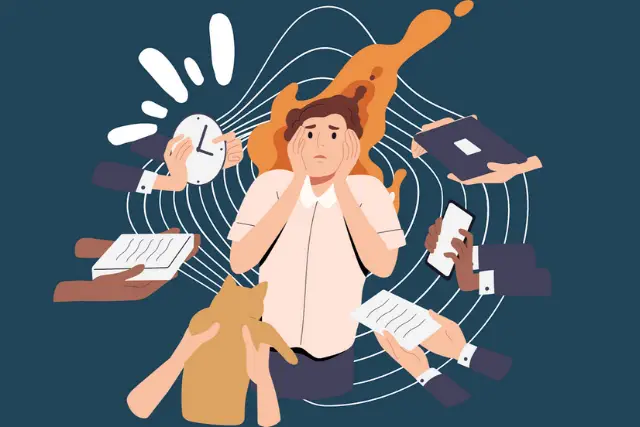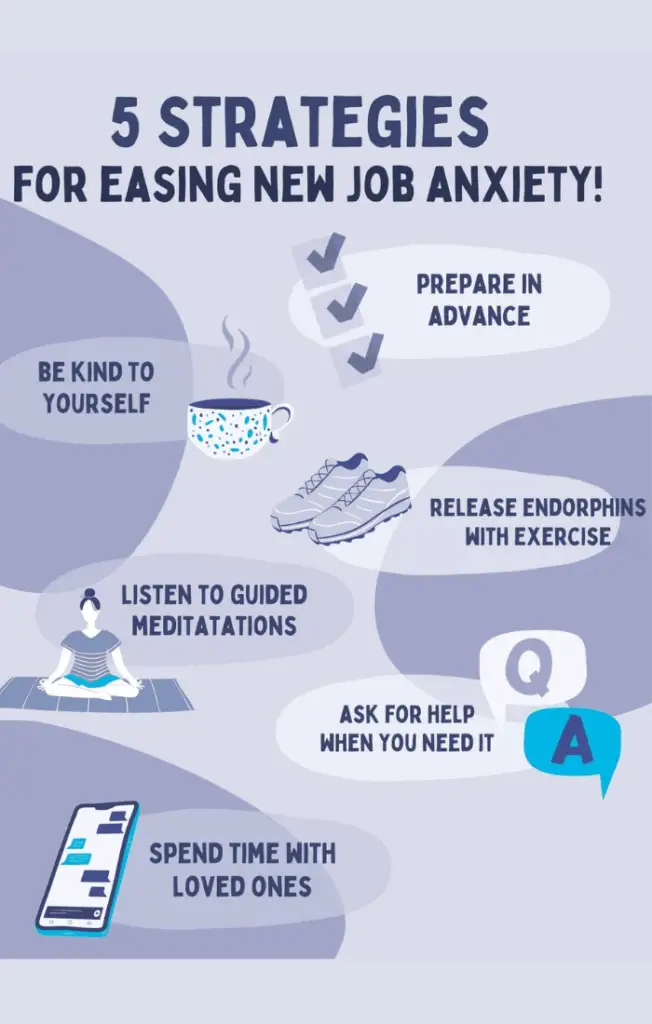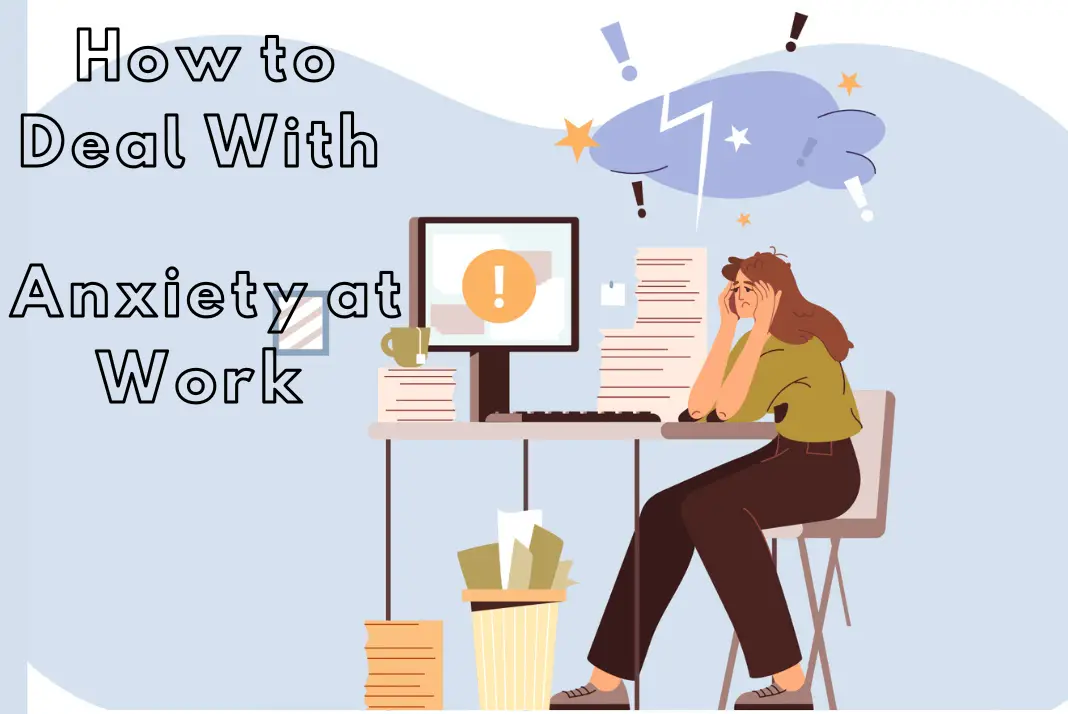Anxiety at work is something many people face, but not everyone talks about. Between tight deadlines, high expectations, and a fast-paced environment, it’s easy to feel overwhelmed. Workplace anxiety is a generalized anxiety disorder. It can affect focus, productivity, and overall happiness, making it hard to do your job effectively. But the good news is there are simple ways to manage anxiety at work.
This article will tell you how to deal with anxiety at work. Understand the anxiety symptoms and causes of workplace anxiety that lead to job problems. Then find out effective tips to reduce work stress and live in a stress-free work environment.
Table of Contents
How to Deal With Anxiety at Work?
Stress and anxiety at work are common problems many people face. It can be due to short deadlines, a load of work, toxic employees or managers, and personal issues. Symptoms of work anxiety may include trouble focusing on work, fatigue, irritability, and physical problems such as headaches or muscle pain.
It is important to understand work anxiety symptoms because work anxiety can lead to burnout, lower productivity, and even mental health problems. Practicing effective stress management techniques, setting boundaries, and creating a better work-life balance can help reduce work anxiety. Some employee assistance programs work in companies to help employees with anxiety.
By taking small steps to handle work-related stress, it’s possible to improve your mood, stay motivated, and enjoy your work more.
What Causes Work Anxiety?
- Managing many tasks or tight deadlines can lead to overwhelming stress.
- Worrying about job stability can increase anxiety and make you feel uneasy.
- Not having control over your tasks or schedule can create feelings of helplessness.
- Struggling to balance work and personal life often leads to burnout and stress.
- Tense relationships at work can make the workplace feel stressful.
- Pressure to meet high expectations can trigger anxiety about making mistakes.
- Not knowing what’s expected of you creates confusion and frustration.
- Feeling unsupported by supervisors or teammates can increase workplace anxiety.

10 Tips to Cope With Work Anxiety
If you feel anxious at work, it is important to know the causes. By removing the feelings of anxiety, you can work with more focus and increase your job performance.
Following are some tips that can effectively help you in dealing with workplace anxiety.
1. Know Your Triggers
Understanding what specifically causes your anxiety can help you address the root cause. It can be deadlines, the load of work, a toxic environment, or personal issues. When you know your triggers, you can avoid them and manage work anxiety.
2. Develop Go-To Grounding Tools
Developing your grounding tools can help you divert your attention from the anxiety. Most of these tools include techniques like yoga, performing breathing techniques, or even focusing on specific objects in the room that you can touch or hear. Grounding helps you stay in the present moment and not worry about future deadlines.
3. Create the Right Conditions
Sometimes, the main trigger is the working environment if there are no breaks. Take breaks and do activities like tidying out your desk, reducing exposure to stressors like social media platforms, and having a balanced schedule with limited tasks. It is also important to take breaks between office time, eat healthy foods, and exercise.
4. Set Micro-Goals
Break down the larger tasks into small tasks and make a to-do list. This can help you prioritize the tasks and do them accordingly. This way your work becomes manageable and you do not stress at work.
5. Work Within Your Limits
To manage your work-life balance, it is important to work within your limits. Don’t hesitate to say no to tasks you have not agreed to. Break down larger tasks into smaller parts. Make a to-do list. Take certain breaks between the work time. Talk openly with your manager about your work stressors.
6. Practice Healthy Habits
Practice healthy habits to reduce anxiety and stress. Begin your day by stretching or walking, which can help clear your mind. Make sure to stay hydrated, eat balanced meals, and limit your intake of caffeine and sugar, as these can increase anxiety levels. Prioritize getting enough sleep, and do deep breathing to stay active.
7. Practice good time management
Practice good time management. Divide your work hours according to the tasks. Think about the work that is to be done first. Prioritizing tasks, breaking down tasks into smaller sections, and making a to-do list can help you effectively manage your time.
8. Communicate with your manager when you need help
Workplace anxiety revolves around work. When you feel overwhelmed at work, talk to your manager. Tell your employer about your anxiety and what is triggering you. He may reduce your work load which can reduce your stress levels.
9. Practice anti-anxiety techniques outside of work
Do anti-anxiety activities outside of work. Do things that bring you joy and calm. Exercising, walking, eating healthy, and getting enough sleep. Involve in deep breathing also at home to relax your mind and body.
10. Know when to ask for additional help
If you have no idea how to control your work anxiety, have a load of work, or have deadlines too close, it is time to ask for help. Ask other employees or your manager to help you in work. It can increase the overall work performance.

Conclusion
Everyone experiences stressful moments at work. Overload of work, tight deadlines, health problems, toxic work environment, or personal issues cause workplace anxiety. It is important to understand the symptoms of anxiety to effectively manage it. Try techniques like prioritizing tasks, making a to-do list, taking breaks, getting enough sleep, eating a healthy diet, do deep breathing and physical exercises.
Enjoy your life outside of work fully. Do activities or hobbies that you like. Meet friends and family. It is also advised to seek professional help if you can’t manage your anxiety triggers. The mental health professional can offer more effective coping strategies according to your situation.

